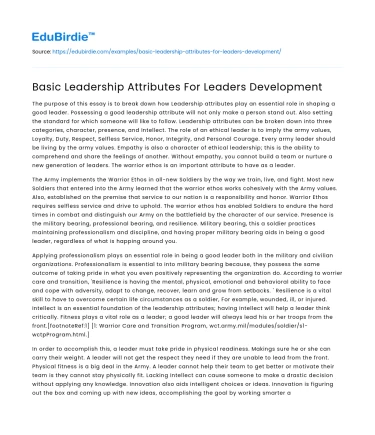Introduction
Leadership remains a pivotal factor in the success and sustainability of organizations across various sectors. As the global landscape evolves, the demand for effective leaders who can navigate complex challenges and inspire teams has become increasingly crucial. Developing leadership skills is not just about acquiring management techniques but involves cultivating a set of attributes that enable individuals to guide others effectively. This essay examines the basic leadership attributes necessary for leaders' development, highlighting their significance in fostering organizational growth. Through a detailed exploration of these attributes, supported by examples and academic insights, the discussion underscores the essential qualities that contribute to successful leadership. Furthermore, potential counter-arguments are addressed to provide a comprehensive understanding of the subject, ensuring that the analysis is both balanced and well-rounded.
Visionary Thinking and Strategic Planning
A fundamental attribute of effective leadership is visionary thinking coupled with strategic planning. Visionary leaders possess the ability to foresee future trends and set a clear direction for their teams. This foresight is essential in crafting strategies that align with organizational goals and ensure long-term success. According to Kouzes and Posner (2017), "Leaders inspire a shared vision by envisioning the future and enlisting others in their dreams." For instance, Steve Jobs' visionary leadership at Apple revolutionized the technology industry by setting new standards in innovation and design. His capacity to anticipate market needs and inspire his team exemplifies the power of a clear vision in achieving exceptional outcomes.
Save your time!
We can take care of your essay
- Proper editing and formatting
- Free revision, title page, and bibliography
- Flexible prices and money-back guarantee
Strategic planning, on the other hand, involves translating this vision into actionable steps. It requires analytical skills and the ability to prioritize tasks effectively. Leaders who excel in strategic planning are adept at resource allocation, risk assessment, and contingency planning. The integration of visionary thinking and strategic planning enables leaders to not only articulate a compelling vision but also to implement it successfully. Critics might argue that excessive focus on vision can overshadow immediate challenges. However, a balanced approach that incorporates both vision and strategy can mitigate such risks, ensuring adaptability and resilience in a dynamic environment.
Emotional Intelligence and Effective Communication
Emotional intelligence (EI) is another critical attribute for leaders, comprising self-awareness, self-regulation, empathy, motivation, and social skills. Daniel Goleman (1995), a renowned psychologist, emphasizes that "the most effective leaders are alike in one crucial way: they all have a high degree of emotional intelligence." EI enables leaders to understand their emotions, manage their reactions, and foster healthy relationships within their teams. This understanding is pivotal in creating a supportive and inclusive work environment, which is conducive to productivity and innovation.
Effective communication, a component of emotional intelligence, involves not only conveying information clearly but also listening actively. Leaders who communicate effectively can articulate their vision, provide constructive feedback, and encourage open dialogue. A case in point is Satya Nadella, CEO of Microsoft, whose emphasis on empathy and open communication has transformed the company's culture and performance. Skeptics might argue that emotional intelligence is less tangible and harder to quantify compared to technical skills. Nonetheless, its impact on team dynamics and organizational success is well-documented, making it an indispensable attribute for leaders.
Adaptability and Continuous Learning
In an ever-changing world, adaptability and a commitment to continuous learning are vital leadership attributes. Adaptable leaders are flexible, open to new ideas, and can pivot strategies in response to changing circumstances. This flexibility is crucial in navigating uncertainties and maintaining organizational stability. As noted by Heifetz, Grashow, and Linsky (2009), "adaptive leadership is the practice of mobilizing people to tackle tough challenges and thrive." Examples of adaptive leaders include Jeff Bezos, whose willingness to embrace change has kept Amazon at the forefront of innovation.
Continuous learning complements adaptability by encouraging leaders to stay informed and improve their skills. This lifelong learning mindset fosters a culture of curiosity and growth, which is essential in today’s knowledge-driven economy. While some may argue that constant change can lead to instability, adaptable leaders balance innovation with stability, ensuring sustainable progress. Thus, the interplay between adaptability and continuous learning equips leaders with the tools to lead effectively in a rapidly evolving landscape.
Conclusion
In conclusion, the development of leadership skills hinges on the cultivation of key attributes such as visionary thinking, emotional intelligence, and adaptability. These traits not only enhance a leader's ability to inspire and guide but also contribute to organizational success. By integrating strategic planning, effective communication, and a commitment to continuous learning, leaders can navigate the complexities of modern environments with confidence and competence. While challenges and counter-arguments exist, the importance of these attributes in fostering resilient and innovative leadership remains undeniable. As organizations strive to develop future leaders, prioritizing these essential traits will be crucial in addressing the demands of an ever-evolving global landscape.






 Stuck on your essay?
Stuck on your essay?

